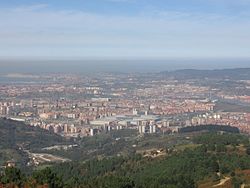Baracaldo
| Barakaldo | |||
|---|---|---|---|
| City | |||
 |
|||
|
|||
| Location of Barakaldo within the Basque Country | |||
| Coordinates: 43°17′50″N 2°59′30″W / 43.29722°N 2.99167°WCoordinates: 43°17′50″N 2°59′30″W / 43.29722°N 2.99167°W | |||
| Country |
|
||
| Autonomous community | Basque Country | ||
| Province | Biscay | ||
| Comarca | Greater Bilbao | ||
| Founded | pre 1051 | ||
| Government | |||
| • Mayoress | Amaia del Campo Berasategi (2015-Today) (PNV) | ||
| Area | |||
| • Total | 25.03 km2 (9.66 sq mi) | ||
| Elevation | 39 m (128 ft) | ||
| Highest elevation | 560 m (1,840 ft) | ||
| Lowest elevation | 0 m (0 ft) | ||
| Population (2013) | |||
| • Total | 100,502 | ||
| • Density | 4,000/km2 (10,000/sq mi) | ||
| Demonym(s) | baracaldés, -sa | ||
| Time zone | CET (UTC+1) | ||
| • Summer (DST) | CEST (UTC+2) | ||
| Postal code | 48900, 48901, 48902 and 48903 | ||
| Dialing code | 94 | ||
| Website | Official website | ||
Barakaldo is a city in the Basque Country in Spain. It is located in the Biscay (Bizkaia) province, administratively included in the "Basque Autonomous Community", on the left bank of the Estuary of Bilbao. Barakaldo is part of Bilbao's metropolitan area (Greater Bilbao), and its official population at the 2011 census was 100,061 inhabitants living on a land area of 29.39 km2 (11.35 sq mi). The area has an industrial river-port heritage and has undergone significant redevelopment with new commercial and residential areas replacing the once active industrial zones.
The 1911 Encyclopædia Britannica wrote of Barakaldo (spelling the name with the now-archaic "c"):
"Pop.(1900): 15,013. Few Spanish towns have developed more rapidly than Baracaldo, which nearly doubled its population between 1880 and 1900. During this period many immigrant labourers settled here; for the iron works and dynamite factory of Baracaldo prospered greatly, owing to the increased output of the Biscayan mines, the extension of railways in the neighbourhood, and the growth of shipping at Bilbao. The low flat country round Baracaldo is covered with maize, pod fruit and vines".
Modern Barakaldo was later the endpoint of a mining railway, since iron mining was a major economic activity of the region during part of the 19th and 20th centuries. The Steel industry, led by Altos Hornos de Vizcaya, had a very important presence during the 20th century, until the industrial recession hit the region's economy hard in the 1980s.
Over recent decades, the industrial zones surrounding Barakaldo have declined in importance as several large companies have shut down, (e.g. Babcock & Wilcox). There are still some active factories, however areas, that were once largely industrial, are continuing to be redeveloped into residential properties, parks and shopping malls (e.g. IKEA and the MegaPark). A large exhibition centre (BEC, Bilbao Exhibition Centre) has recently been built on the outskirts of the town at Ansio.
...
Wikipedia



